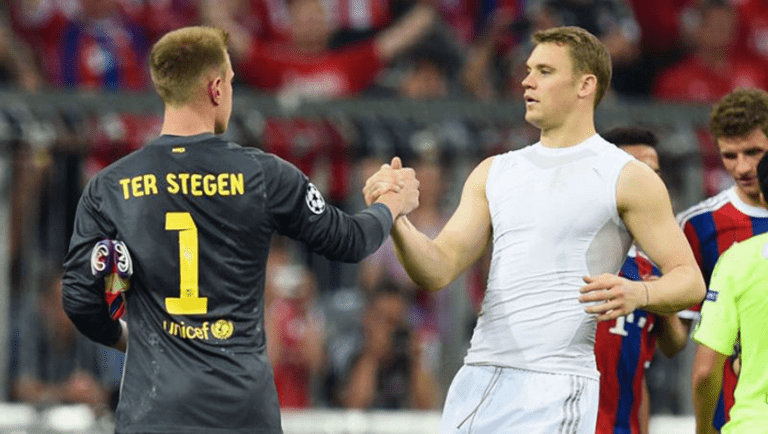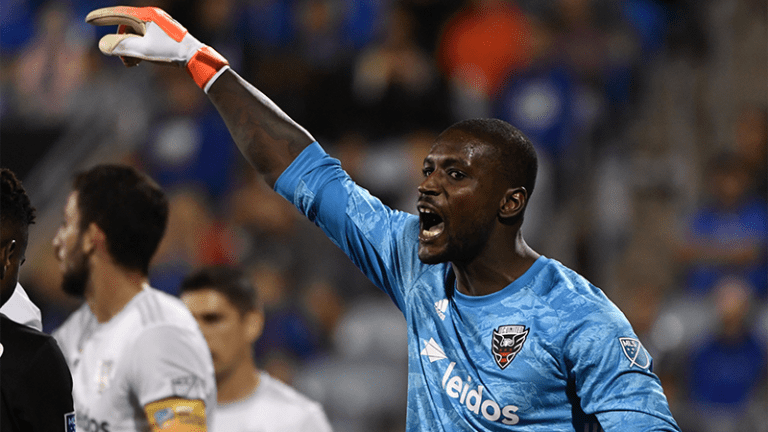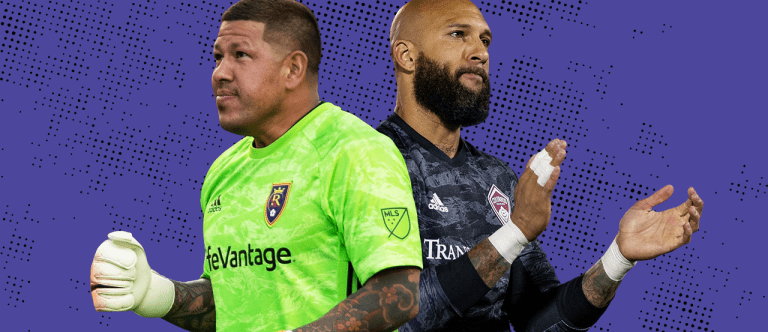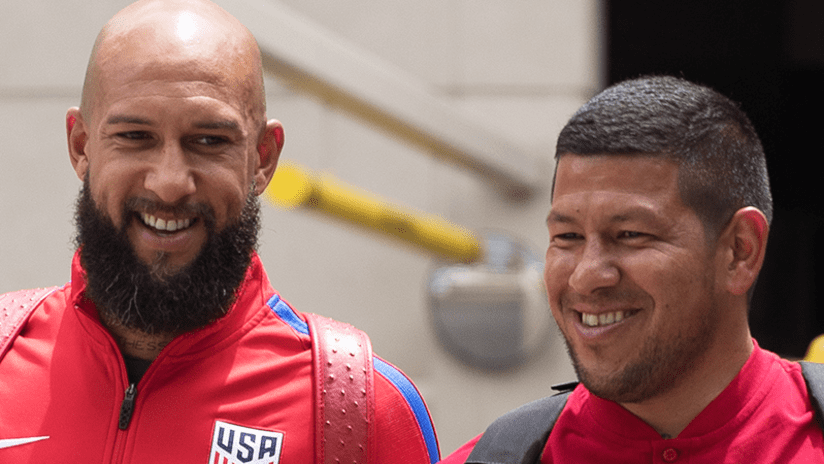Tim Mulqueen has one ask of the American soccer public: Don’t take them for granted.
“We need to grateful for what these guys and the guys who came before them have given us,” said the Memphis 901 FC coach and longtime MLS and US youth international goalkeeper coach. “It's special and we may not ever see it again. There's no guarantee.”
His comments come on the eve of the closing of a true chapter in American soccer, as Colorado Rapids goalkeeper Tim Howard and his Real Salt Lake counterpart Nick Rimando get set to play their final regular-season games this weekend.
Howard, 40, started as a pro in MLS in 1998 and made 399 Premier League appearances between Everton and Manchester United. He amassed 121 caps with the US men’s national team and featured at three World Cups. Rimando, also 40, first emerged as a rookie in 2000 and today holds the record for most MLS appearances (513). He also has 22 USMNT caps, making the 2014 World Cup roster.
They followed different paths – Rimando went to UCLA before turning pro in MLS, while Howard bypassed college and played first with the USISL's North Jersey Imperials and then with the MetroStars in MLS – yet both end their careers in revered territory.
But as these two American goalkeeping pillars retire – only a few years after a previous wave of star 'keepers called it a career, including Kasey Keller (2011), Brad Friedel (2015) and Marcus Hahnemann (2014) – questions loom over what comes next. Just ask Howard himself.
“I think there have been a few generations of goalkeepers who should have come through by now and they haven't,” Howard told MLSsoccer.com last week. “When you look at some of us who played in the Premier League for decades, I think it became en vogue to say, 'Oh American goalkeepers are fit for the Premier League and this is how it works.' When you see that little bit of a gap now, I think people begin to realize just how difficult not only playing in the Premier League is, but playing in the Premier League and being successful is.”
And so, where do we go from here?
A generational shift
Former Canadian international Pat Onstad is quick to crack a joke when asked about what has changed most about goalkeeping over the two decades, referencing his old Houston Dynamo coach, Dominic Kinnear, as they teamed up to win two MLS Cups.
“If I started passing out of the back, Dom would pull out the last hairs on his head,” said Onstad, now the technical director at Columbus Crew SC. “It's probably why he doesn't have any hair now.”
It’s a tongue-in-cheek remark from Onstad, but one that also speaks to the position’s transformation. Now, more than ever, goalkeepers are asked to be part of the attack and not just boot it long.
“Coming into Miami, that wasn't the case,” Rimando said. “We had special players back then, but it was direct, get the ball out wide, cross the ball in. Now you're starting to see more and more teams in MLS nowadays that are trying to build out of the back and find that pretty soccer.”
Decision-making, positioning, reading the game, grabbing crosses, coming off your line – it all happens faster now in modern soccer. At the same time, the basics haven’t changed too much. Goalkeepers, ultimately, are still judged by how often they keep the ball out of the net.
It’s a point that Tom Dutra, the longtime Seattle Sounders’ goalkeeper coach, hit home.
"I think that's sometimes the confusion that comes about, where people are caught thinking he's a good goalkeeper because he's good with his feet,” Dutra said. “Fair enough, but is he a good goalkeeper overall? You look at the very best goalkeepers in the world and we talk about [Manuel] Neuer, we talk about [Andre] ter Stegen – you watch those players and they're the best shot-stoppers.”

German goalkeepers Andre ter Stegen and Manuel Neuer are still recognized among the world's best.
One area that has undeniably changed is the number of pathways goalkeepers face as they begin their professional careers. When Howard and Rimando started in 1997 and 2000, respectively, MLS was in its early stages and the USL infrastructure we see today didn’t exist. College soccer was more robust and the Development Academy wasn’t around.
Now, as MLS has evolved and expansion continues, Homegrown Players are breaking into matchday rosters with greater frequency. But goalkeepers are trickling through at a slower pace, and Onstad has an idea why.
“If a kid has an opportunity to play in college for a few years and get 40, 45 games under his belt, that may be a better choice than going and being a third goalkeeper,” he said. “Often in our league, maybe that role means you get some USL games if you have a USL affiliate, but you're just a training goalie. You’ll be a pro, but making that next step can be really hard.”
There’s also generally less rotation at goalkeeper, especially as coaches stick with their preferred XI.
“With goalkeepers, is it better to get 40 to 60 games or is it better for you to be the backup with a USL team and not be quite ready for that shock of not being the guy?,” Dutra posed. “It's important to go in and play games.”
Reasons to worry?
As Howard and Rimando hang up their boots, a level of concern emerges. It’s raised by goalkeeper coach Dan Gaspar, a Portuguese-American who’s worked for Portugal and Iran at World Cups and with Benfica and Porto at club level.
“With that golden generation we produced, we got comfortable,” Gaspar said. “We just assumed and got complacent that our level would continue. Now, we're in a situation where we didn't invest when we're on top and there are some question marks. It's not that we don't have good goalkeepers in MLS, we certainly do. It’s one of the hottest exports for American soccer players.”
One of those exports is Zack Steffen, the 2018 MLS Goalkeeper of the Year with the Crew. Steffen is now at Bundesliga side Fortuna Dusseldorf, on loan from Premier League champions Manchester City. After that, the American goalkeeping options at top European clubs are sparse, with Ethan Horvath at Belgian side Club Brugge.
Mulqueen feels the current trend is that more goalkeepers are staying in North America given the improved training grounds, stadiums and salaries in MLS. D.C. United goalkeeper Bill Hamid, who’s currently back on loan with his boyhood club from Danish side FC Midtjylland, noted how that level of comfort can prove beneficial.
“Guys are making decisions to stay,” said Hamid, pictured below. “They’re happy, that’s the most important thing.”

D.C. United goalkeeper Bil Hamid is back in net for his hometown club, on loan from Danish side FC Midtjylland | Courtesy: Eric Bolte/ IMAGN.
New York Red Bulls goalkeeper coach and former MLS 'keeper, Preston Burpo, hopes more domestic goalkeepers help to push MLS forward.
“As much as there’s prestige of playing overseas and in the Premier League, I would still hope this league and the owners are trying to keep the best athletes here for a while,” Burpo said. “If you're Zack Steffen, you have the offer to go [Manchester] City, you're going. But I would hope at some point down the road that people would rather stay here, to be quite honest, and make this league better and better.”
And Rimando, who’s an MLS lifer, cautioned against any alarmism surrounding the quality of today's goalkeepers, whether they are based home or abroad.
"Being in [national team] camp and seeing these guys day-to-day in my career, training with them, I've seen that there are good goalkeepers,” Rimando said. “Maybe they're not the Brad Friedels, the Tim Howards, the Kasey Kellers that we've seen for a long, long time. I think we just need to give them more time in the spotlight and let them show us how valuable they are.”
Pressure and sacrifice
How can American goalkeeping continue to meet that high standard? Howard shared some insight from a player’s perspective.
“I think the conversation is simple,” Howard said. “You have to be willing to sacrifice everything, marriage, friends. You're going to miss funerals, anniversaries, birthdays. You'll have to go to some dark places for a long, long time and I'm not sure everyone is cut out for that. That's the long and short of it. If you're going to do it and be committed to it, there are a lot of sacrifices. It has to be one, two and three on your priority list and if it's not that, then I think you'll see that drought continue.”
For Onstad, it comes down to increased pressure on American goalkeepers to prove themselves at the highest level in MLS and then overseas, much like Steffen.
“As the league becomes bigger and bigger and fans become more and more involved and ownership does as well, there becomes more internal pressure in the league,” Onstad said. “That will help drive that goalkeeper position. If you don't have that pressure and you're comfortable making mistakes or it's, 'Oh, it's alright we're in eighth place and can still qualify for the playoffs,' that's not enough. Once there's media pressure, all that external pressure, you'll see the guys who can take it and step through.”
Part of it, Mulqueen argued, is also about improving coaching.
“Sometimes we get bogged down in reinventing the wheel in goal, and we don't need to,” Mulqueen said. “We need to increase our goalkeeper training, get them more active in team environments and not just specific to the position. That will accelerate their progress, and then it'll be up to the player.”
Will Howard and Rimando play a part?

The final MLS regular season matches for Nick Rimando (left) and Tim Howard (right) will take place on October 6.
As they get set for their final regular season matches on Decision Day – Rimando and RSL against Vancouver (4 pm ET | TSN, MLS LIVE on ESPN+ in US) looking to secure home-field advantage in the Audi 2019 MLS Cup Playoffs and Howard and Colorado in a do-or-die match against LAFC (4 pm ET | MLS LIVE on ESPN+ in US, on DAZN in Canada) – each goalkeeper will be firmly focused on the task at hand. Just as they’ve done for the last two decades.
But they’ve also given thought to their next steps. Asked about exactly that, neither delve into too many details.
“With goalkeeping, I'll never be too far away from that because it's what I know,” Howard said. “If there's anything I can do to help these young goalkeepers, I'll absolutely try my best. But there are also other things I plan on doing moving forward.”
Added Rimando: “I don't know exactly what capacity that's going to be in. I'd love to be involved in some way, for sure. Again, I'm not committed to anything. This ball has given me so much in my life and I've seen the world and it's given my family a very good life. I think I have some good to give back.”













